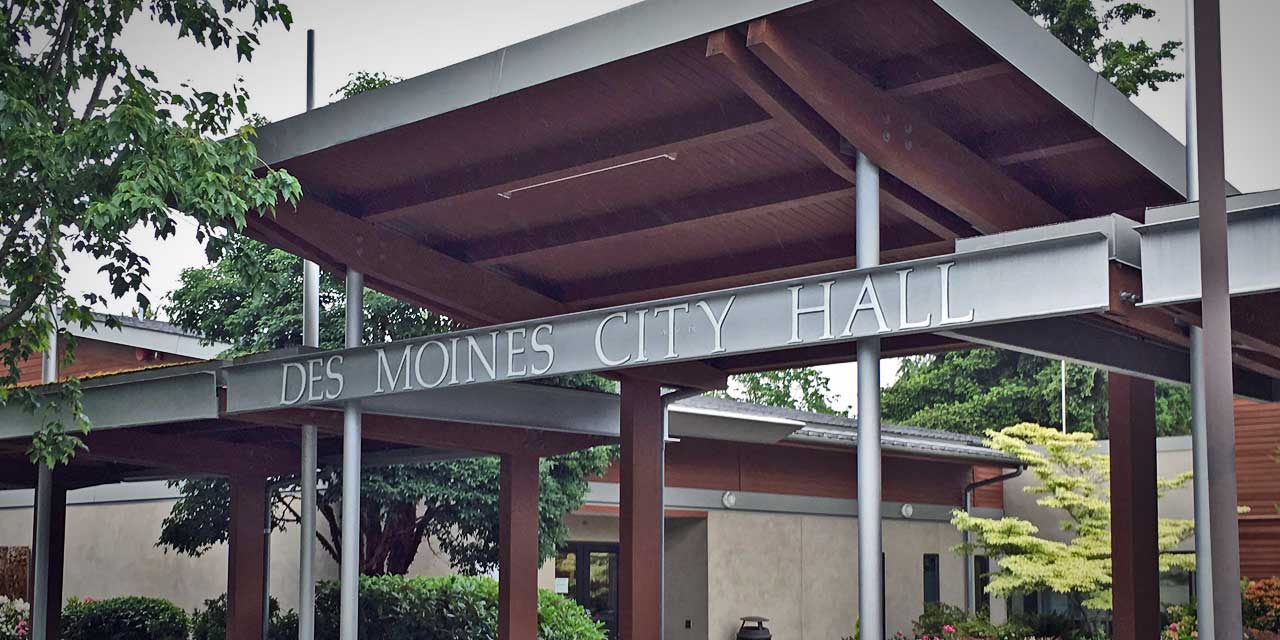Here’s our recap of the Des Moines City Council Study Session held on Thursday night, Mar. 7, 2024:
Steven J. Underwood Memorial Scholarship & Proclamation
Council voted unanimously in support of an official proclamation recognizing March 7th as a day to remember Master Police Officer Steven J. Underwood. Officer Underwood was killed in the line of duty on March 7, 2001, when questioning four juvenile suspects on Pacific Highway. He was attacked on initial contact with the youth, and shot to death.
The city has celebrated the life of Officer Underwood ever since, and the council continues to contribute to a scholarship in his name. The money until now came out of the council’s Hearts & Minds Fund. Council recently decided to end the fund when they could not reach agreement on rules for using the funds.
One thing they nearly all agreed on, however, was supporting this scholarship fund. In a 6:1 vote, Council chose to contribute $25 each per month from their stipends directly into the Steven J. Underwood scholarship fund. Councilmember Harrris voted against it, only because as he said, it shouldn’t be Council’s policy to support any particular charity.
Draft Communications Assessment by Consor
The city hired Consor to assess ways to improve communications with residents. After conducting polls, focus groups, interviews, and surveys, Consor reported back with early findings. They will have more thorough recommendations at a future presentation, taking into account feedback from this initial assessment.
One need that was expressed consistently is to create a dedicated Communications position on city staff, someone whose job it is to increase transparency and accountability, define clear protocols, and have more consistent informative onboarding and training. Feedback from businesses included the need for clearer processes for how to do business in Des Moines, and a request for a little more support getting started. Residents would also like increased communication from the mayor, accessible community engagement events, and a stronger focus on customer service among city staff. In addition, respondents wanted to see a better-functioning website with a more useful community calendar, a stronger social media presence, and more frequent issues of City Currents Magazine. In essence, people wanted clearer and more timely communication.
Consor received 309 surveys from community members. Fifteen business owners joined the business focus group. Consor said the residents focus group had only 7 attendees, but later during public comments multiple people said there were actually 11 people participating. Consor presenters said it is hard to get young people to take surveys or participate in focus groups, so the population giving feedback skews older than the general population. It also skews whiter. According to the surveys though, 54% of respondents believe the city’s communication efforts are above satisfactory.
Public Comments
Before Council discussed the findings, they took comments from the public. Mayor Traci Buxton said that people are also welcome to send comments on this topic via email to [email protected]. Anyone wishing to do so should make sure to submit comments within the next week.
Multiple speakers mentioned that the findings of Consor are not new. The recommendations Consor shared are the same things community members have been requesting for years. They said the study cost the city $75,000 without providing any surprising information.
One speaker said the city could move away from the print edition of City Currents, and instead publish a more frequent online magazine with up to date information. Another said that if they want a wider demographic to be able to attend focus groups, Consor should not hold them on a weekday at 1pm when most people are working. They added that focus groups should be kept intentionally small, so quieter voices don’t get drowned out. People also asked for staff to be better about responding to emails.
Council Discussion
Deputy Mayor Harry Steinmetz said that the city just doesn’t have the staff to implement many of the ideas for better communication. It was also mentioned that any communications position shouldn’t be filled until a new city manager is found. Multiple councilmembers expressed concern with the failure to reach out to the city’s non-white population, as well as to younger people.
Councilmember JC Harris reiterated that city staff are already working at max capacity, so asking them to do more isn’t going to work. He expressed a strong desire to make a one-time investment in software that could solve a lot of these communications issues at once, rather than investing in outmoded technology. He said the council should invite app venders to present their products at a meeting. He explained that an app would be more efficient for staff than managing multiple social media sites, which are unreliable ways to communicate with the public. He said the recommendations made by Consor would only satisfy the members of the community that are already engaged with the city, when what they need to do is reach new people. The majority of the city does not see current requests for engagement from the city.
Councilmember Yoshiko Grace Matsui said in her work they use a simple code enforcement app. She said it’s easy to use; residents just snap a picture of an issue they find, and the app instantly submits it to the parties who can address it.
Councilmember Matt Mahoney mentioned that the City Currents magazine costs $15,000 each month to produce, so increasing production would definitely come with a cost. He also mentioned that the recent Marina Steps meeting was planned and publicized for months, yet he heard from people who felt that the meeting was sprung on them because they hadn’t been informed about it until the last minute. Somehow, the city’s communications are bypassing the majority of the population.


